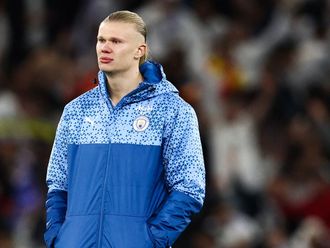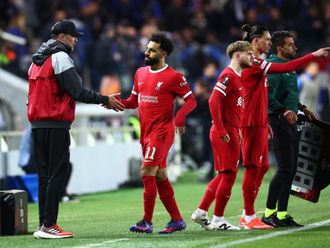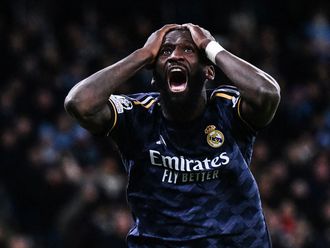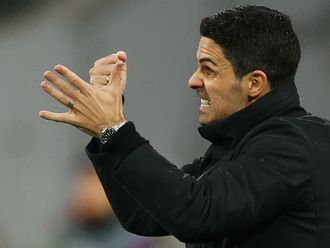London: There is no question who is the most significant figure in the immediate future of Manchester United.
It is not Wayne Rooney, it is not Angel Di Maria, it is not even Louis van Gaal. The person on whose efforts over the next fortnight the well-being of the enterprise depends is the club’s executive vice-chairman, a man who, thus far into his tenure, boasts a significantly longer job description than list of achievements.
No one could accuse Ed Woodward of looking the part. Lurking on the fringes of photographs taken at the weekend of Rory McIlroy and Sir Alex Ferguson in the Old Trafford directors’ box, Woodward hardly carries the air of someone at the heart of the endeavour.
He does not exude the kind of confidence that might be considered necessary for a man in his position.
United supporters can only hope appearances are deceptive. Woodward has a first-class commercial pedigree, his ability to extract maximum monetary return from the United name when he was in charge of sponsorship issues made him hugely valued by the Old Trafford hierarchy.
But now he has to demonstrate that he can apply that negotiating savvy to a very different trading environment: the transfer market.
It would be generous indeed to suggest Woodward has been a success in his dealings so far in that arena. While he might have forced through extraordinary deals to strengthen United’s bottom line, he has been far less adept in his efforts to strengthen them on the pitch.
His first transfer window was abject, characterised by panicky attempts to land unattainable assets, culminating in the overpriced purchase of Marouane Fellaini. His second resulted in the hugely expensive purchase of Juan Mata, a decent, inventive player, but one who has yet to demonstrate any significant match-winning prowess.
While there might be a degree of understanding for Woodward’s lacklustre early showing, given that he was new to the job and was initially partnered by a manager renowned for his caution, any reservoir of sympathy will have dried up among United followers: he simply has to get it right this time.
In a way, Woodward is now obliged to wrestle with the consequences of policy he inherited. Latterly, under Ferguson the approach was to buy young players who could be developed on the training pitch.
It was a methodology that had worked supremely well in the case of Cristiano Ronaldo. It was a policy, too, which found much favour with the club’s owners, who were assured there was no need for extravagant buys.
Unfortunately, of those purchased to that model, only David de Gea has suggested it might be a success. Phil Jones, Chris Smalling, the Da Silva twins, Anderson, Nani, Antonio Valencia: none of them have given hint that they might develop into world-class operators. Ferguson’s preference for potential over the marquee buy has meant that, since Rooney arrived 10 summers ago, only Dimitar Berbatov and Robin van Persie can be legitimately categorised as big name signings by United.
The ultimate corollary of this policy has been that Van Gaal has found himself with a squad in which only three players - Rooney, Van Persie and De Gea - could be considered of European, never mind world, class.
Urgent action is required to beef up the playing staff if the new manager is to have any hope of competing. Van Gaal may be a fine tactician and an astute man manager. But as was demonstrated by the wretchedly thin performance against Swansea City on Saturday, he is not an alchemist.
It means if United are to regain something close to their previous prominence, Woodward is going to have to deliver something pretty spectacular over the next fortnight.
Ander Herrera and Luke Shaw can only be considered the beginning, not the sum total of what is required. Whatever the cost, Woodward needs to land at least three players already at the top of their game: a centre back, a central midfielder and a pacy wide man.
Anything less and another season of disappointment and frustration beckons. On Woodward everything depends.












